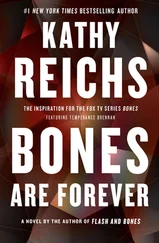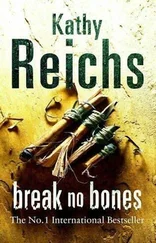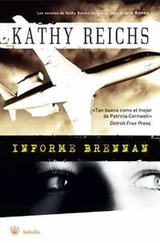At ten-thirty, I phoned Ryan. He said he’d meet me in the lobby in five. I waited ten. Bored, I slipped into the cafeteria for a Diet Coke roadie. At the counter, I made an impulse buy of Scottish shortbreads. One never knew.
Ryan was waiting when I returned to the lobby. Popping the soda, I stashed the cookies in my shoulder bag.
For twenty-seven years Avram Ferris had run his import business out of a light-industrial park off the autoroute des Laurentides, midway between Montreal island and the old Mirabel airport.
Constructed in the seventies, Mirabel was envisioned as Montreal ’s once-and-future aviation jewel. Though thirty miles out, a high speed rail line was to connect the airport with the city center. Lickety-split. You’d be at the gate!
The rail line never happened.
By the early nineties the commute was intolerable and getting worse. Sixty-nine bucks for a taxi downtown.
Frustrated, officials finally threw in the towel and mothballed Mirabel in favor of its geographically friendlier rival. Mirabel now gets cargo and charters. All other domestic, North American, and international flights arrive and depart Dorval, recently rechristened Pierre Elliott Trudeau International.
Avram Ferris didn’t care. He’d started Les Imports Ashkenazim near Mirabel, and that’s where he’d kept it.
And that’s where he’d died.
He’d lived in Côte-des-Neiges, a middle-class residential neighborhood tucked behind the Jewish General Hospital, just northwest of le centre-ville.
Ryan took the Décarie expressway, cut east on Van Horne, then north on Plamondon to Vézina. Pulling to the curb, he pointed to a two-story redbrick box in a row of two-story redbrick boxes.
I scanned the block.
Each building was identical, its right side a mirror image of its left. Wood-framed doors jutted in front, balconies hung from upstairs windows. All walks were shoveled. All shrubs were wrapped. In the driveways, Chevy and Ford station wagons waited under tubular-framed, plastic-shrouded shelters.
“Not the Jaguar and SUV set,” I said.
“Looks like the homeowners held a meeting and banned any trim that ain’t white.”
Ryan chin-cocked the building directly opposite. “Ferris’s unit is upstairs on the left. His brother’s down, Mama and another brother are in the duplex next door.”
“Ferris’s commute must have been hell.”
“Probably stayed here out of love of architectural self-expression.”
“You said Avram and Miriam had no kids?”
Ryan nodded. “They married late. The first wife had health problems, died in eighty-nine. Ferris remarried in ninety-seven. So far, no progeny.”
“Isn’t that against the rules?”
Ryan gave me a quizzical look.
“The mitzvot.”
The look held.
“Jewish law. You’re supposed to have babies. Not waste your seed.”
“You’re thinking of the farmer’s almanac.”
Ryan and I walked to the small front stoop.
Ryan stepped up and rang the top bell.
We waited.
Ryan rang again.
We waited some more.
An old woman trudged by behind us, grocery cart rattling in cadence with her boots.
“Isn’t the widow supposed to hunker in?” Ryan asked, hitting the bell a third time.
“Shiva only lasts a week.”
“And then?”
“You say daily kaddish, don’t party, don’t shave or snip and clip for a while. But basically you get on with your life.”
“How do you know all this?”
“My first boyfriend was Jewish.”
“Star-crossed love?”
“He moved to Altoona.”
Ryan opened the storm door and pounded.
The cart woman stopped, turned, and stared unabashedly over her triple-wrapped muffler.
To the right, a curtain moved. I touched Ryan’s arm and tipped my head. “Dora’s home.”
Ryan smiled brightly.
“Avram was a nice Jewish boy who went eight years between marriages. Maybe he and Mama were close.”
“Maybe he told her stuff.”
“Or Mama noticed things on her own.”
I thought of something.
“Old ladies like cookies.”
“They’re known for it.”
I reached into my purse and pulled out the shortbreads.
“Mama might warm to us, feel chatty.”
“Damn.” Ryan turned. “We’re good at this.”
Only, Dora didn’t answer the door. Miriam did. She wore black slacks, a black silk blouse, a black cardigan, and pearls.
As on our first meeting, I was struck by Miriam’s eyes. There were dark hollows beneath them now, but it didn’t matter. Those lavender irises were showstoppers.
Miriam was not unaware of the effect her eyes had on men. After flicking a glance at me, she shifted to Ryan and leaned forward slightly, one hand wrapping her waist, the other gathering the cardigan at her throat.
“Detective.” Soft. A little breathy.
“Good morning, Mrs. Ferris,” Ryan said. “I hope you’re feeling better.”
“Thank you.”
Miriam’s skin was ghostly. She looked thinner than I remembered.
“There are a few points I’d like to clear up,” Ryan said.
Miriam’s focus shifted to a point between and beyond us. The old woman’s cart cranked up.
Miriam reengaged on Ryan, and her head tipped slightly.
“Can’t this wait?”
Ryan let the question hang in the triangle of space between us.
“Who is it?” A quavery voice floated from inside the house.
Miriam turned and said something in Yiddish or Hebrew, then reoriented to us.
“My mother-in-law is unwell.”
“Your husband is dead,” Ryan said, not too gently. “I can’t delay a murder investigation for the comfort of the bereaved.”
“I live with that thought every moment of the day. So you believe it’s murder, then?”
“As do you, I think. Are you avoiding me, Mrs. Ferris?”
“No.”
Lavender and blue met head-on. Neither gave way.
“I’d like to ask you again about a man named Kessler.”
“I’m going to tell you again. I don’t know him.”
“Might your mother-in-law?”
“No.”
“How do you know that, Mrs. Ferris? Kessler claimed to know your husband. Have you discussed Kessler with your mother-in-law?”
“No, but she has never mentioned that name. My husband’s business brought him into contact with many people.”
“One of whom may have pumped two rounds into his head.”
“Are you trying to shock me, Detective?”
“Are you aware that your husband dealt in antiquities?”
Miriam’s brows dipped almost imperceptibly. Then, “Who told you that?”
“Courtney Purviance.”
“I see.”
“Is that statement untrue?”
“Ms. Purviance has a tendency to exaggerate her role in my husband’s affairs.” Miriam’s voice was edged like a scythe.
“Are you suggesting she’d lie?”
“I’m suggesting the woman has little in her life but her job.”
“Ms. Purviance suggested your husband’s demeanor had changed prior to his death.”
“That’s ridiculous. If Avram had been troubled, surely I’d have noticed.”
Ryan circled back to his point.
“Is it not true that your husband dealt in antiquities?”
“Antiques formed a very small part of Avram’s trade.”
“You know that?”
“I know that.”
“You’ve told me you know little about the business.”
“That much I know.”
The day was clear with a temperature just above freezing.
“Might those antiquities have included human remains?” Ryan asked.
The violet eyes widened. “Dear God, no.”
Most people are uncomfortable with gaps in conversation. When faced with silence, they feel compelled to fill it. Ryan uses this impulse. He did so now. He waited. It worked.
Читать дальше










